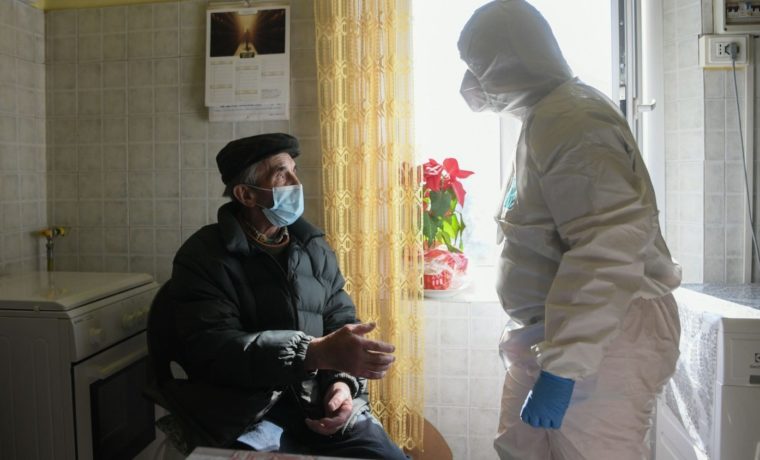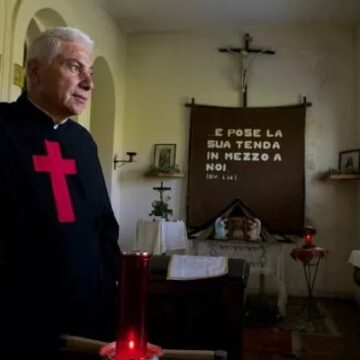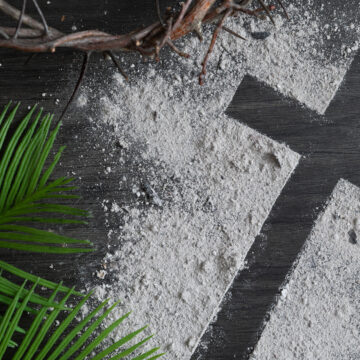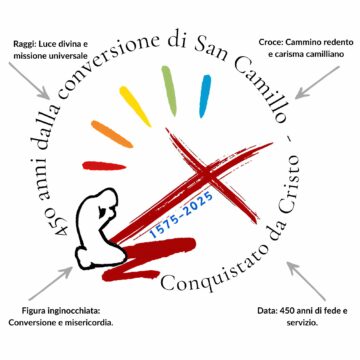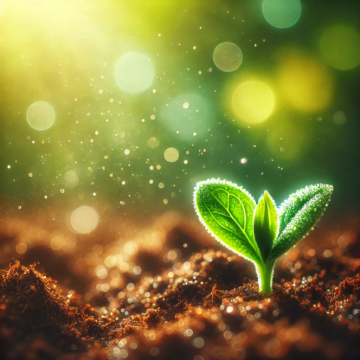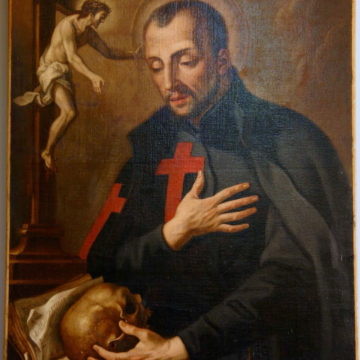PONTIFICAL ACADEMY FOR LIFE
Covid-19 has brought desolation to the world. We have lived it for so long, now, and it is not over yet. It might not be for a very long time. What to make of it? Surely, we are summoned to the courage of resistance. The search for a vaccine and for a thorough scientific explanation of what triggered the catastrophe speak to it. Are we summoned to deeper mindfulness also? If so, how will our pausing keep us from falling into the inertia of complacency, or worse, connivance in resignation? Is there a thoughtful “stepping back” that is other to inaction, a thinking that might mutate into thanking for life given, thus a passageway to life’s rebirth?
Covid-19 is the name of a global crisis (pan-demic) with different facets and manifestations, for sure, yet a common reality. We have come to realize, like never before, that this strange predicament, long-since predicted, yet never seriously addressed, has brought us all together. Like so many processes in our contemporary world, Covid-19 is the most recent manifestation of globalization. From a purely empirical perspective, globalization has effected many benefits to humankind: it has disseminated scientific knowledge, medical technologies, and health practices, all potentially available for everyone’s benefit. At the same time, with Covid-19, we have found ourselves differently linked, sharing in a common experience of contingency (cum-tangere): sparing no one, the pandemic has made us all equally vulnerable, all equally exposed (cfr. Pontifical Academy for Life, Global pandemic and universal brotherhood, March 30, 2020).
Such a realization has come at a high cost. What lessons have we learned? More, what conversion of thought and action are we prepared to undergo in our common responsibility for the human family (Francis, Humana Communitas, January 6, 2019)?
The Hard Reality of Lessons Learned
The pandemic has given us the spectacle of empty streets and ghostly cities, of human proximity wounded, of physical distancing. It has deprived us of the exuberance of embraces, the kindness of hand shakings, the affection of kisses, and turned relations into fearful interactions among strangers, the neutral exchange of faceless individualities shrouded in the anonymity of protective gears. Limitations of social contacts are frightening; they can lead to situations of isolation, despair, anger, and abuse. For elderly people in the last stages of life the suffering has been even more pronounced, for the physical distress is coupled by diminished quality of life and lack of visiting family and friends.
1.1. Life Taken, Life Given: the Lesson of Fragility
The prevailing metaphors now encroaching on our ordinary language emphasize hostility and a pervasive sense of menace: the repeated encouragements to “fight” the virus, the press releases that sound like “bulletins of war,” the daily updates on the number of infected, soon turning into “fallen victims.”
In the suffering and death of so many, we have learned the lesson of fragility. In many countries, hospitals still struggle with overwhelming demands, facing the agony of resource rationing and the exhaustion of health care personnel. Immense, unspeakable misery, and the struggle for basic survival needs, has brought into evidence the condition of prisoners, those living in extreme poverty at the margins of society, especially in developing countries, the abandoned destined to oblivion in refugee camps from hell.
We have witnessed the most tragic face of death: some experiencing the loneliness of separation both physical and spiritual from everybody, leaving their families powerless, unable to say goodbye, even to provide the basic piety of proper burial. We have seen life coming to its end, without heed for age, social status, or health conditions.
But “frail” is what we all are: radically marked by the experience of finitude at the core of our existence, not just occasionally there, visiting us with the gentle touch of a passing presence, leaving us undeterred in the confidence that everything will go according to plan. We emerge from a night of mysterious origins: called into being beyond choice, we come soon to presumption and complaint, asserting as ours what we have only been vouchsafed. Too late do we learn consent to the darkness from which we came, and to which we finally return.
Some say this is all a tale of absurdity, for it all comes to nothing. But how could this nothing-ness be the final word? If so, why the fighting? Why do we encourage each other to the hope of better days, when all that we are experiencing in this pandemic will be over?
Life comes and goes, says the custodian of cynical prudence. Yet its rising and ebbing, now made more evident by the fragility of our human condition, might open us to a different wisdom, a different realization (cfr Ps. 8). For the sorrowful evidence of life’s frailty may also renew our mindfulness of its given nature. Coming back to life, after savoring the ambivalent fruit of its contingency, will we not be wiser? Will we not be more grateful, less arrogant?
1.2. The Impossible Dream of Autonomy and the Lesson of Finitude
With the pandemic, our claims to autonomous self-determination and control have come to a sobering halt, a moment of crisis that elicits deeper discernment. It had to happen, sooner or later, for the bewitchment had lasted long enough.
The Covid-19 epidemic has much to do with our depredation of the earth and the despoiling of its intrinsic value. It is a symptom of our earth’s malaise and our failure to care; more, a sign of our own spiritual malaise (Laudato Si’, n. 119). Will we be able to remedy the fracture that has separated us from our natural world, too often turning our assertive subjectivities into a menace to creation, a menace to one another?
Consider the chain of connections that link the following phenomena: increasing deforestation pushes wild animals in the proximity of human habitat. Viruses hosted by animals, then, are passed on to humans, thus exacerbating the reality of zoonosis, a phenomenon well known to scientists as a vehicle of many diseases. The exaggerated demand for meat in first world countries gives rise to enormous industrial complexes of animal farming and exploitation. It is easy to see how these interactions might ultimately occasion the spread of a virus through international transportation, mass mobility of people, business travelling, tourism, etc.
The phenomenon of Covid-19 is not just the result of natural occurrences. What happens in nature is already the result of a complex intermediation with the human world of economical choices and models of development, themselves “infected” with a different “virus” of our own creation: it is the result, more than the cause, of financial greed, the self-indulgence of life styles defined by consumption indulgence and excess. We have built for ourselves an ethos of prevarication and disregard for what is given to us, in the elemental promise of creation. This is why we are called to reconsider our relation to the natural habitat. To recognize that we dwell on this earth as stewards, not as masters and lords.
We have been given everything, but ours is only an endowed, not an absolute, sovereignty. Mindful of its origin, it carries the burden of finitude and the mark of vulnerability. Our condition is a wounded freedom. We might reject it as a curse, a provisional situation to be soon overcome. Or we can learn a different patience: capable of consent to finitude, of renewed porosity to neighborly proximity and distant otherness.
When compared to the predicament of poor countries, especially in the so called Global South, the plight of the “developed” world looks more like a luxury: only in rich countries people can afford the requirements of safety. In those not so fortunate, on the other hand, “physical distancing” is just an impossibility due to necessity and the weight of dire circumstances: crowded settings and the lack of affordable distancing confront entire populations as an insurmountable fact. The contrast between the two situations throws into relief a strident paradox, recounting, once more, the tale of disproportion in wealth between poor and rich countries.
To learn finitude and to consent to the limits of our own freedom is more than a sober exercise in philosophical realism. It entails opening our eyes to the reality of human beings who experience such limits in their own flesh, so to speak: in the daily challenge to survive, to secure minimal conditions for subsistence, to feed children and family members, to overcome the threat of diseases in spite of the availability of cures too expensive to afford. Consider the immense loss of life in the Global South: malaria, tuberculosis, lack of drinkable water and basic resources still sow the destruction of millions of lives per year, a situation that has been known for decades. All these predicaments could be overcome by committed international efforts and policies. How many lives could be saved, how many diseases eradicated, how much suffering avoided!



